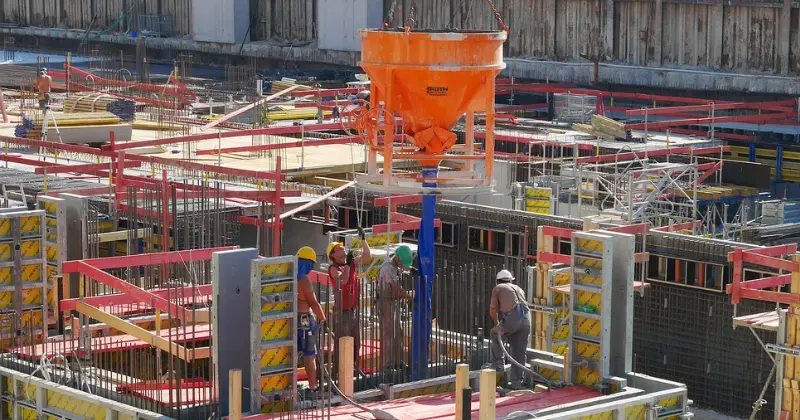11 mins read
Exploring Construction Cost Control Software: Benefits, Challenges & Tips

- What is Construction Cost Control?
- Importance of Cost Control in Construction Projects
- What can Construction Cost Control Software do for You?
- Top Cost Control Software in Construction
- Challenges of Implementing Construction Cost Control Software
- Top 10 Best Practices for Construction Cost Management
- Conclusion
With so many variables involved in construction projects, keeping a firm grip on cost control is essential. The most effective way to do this is to use the right construction cost control software.
Construction cost control software enhances financial efficiency by consolidating the various processes involved in a construction project. This brings all your cost data together, which can be automated across the project’s lifecycle.
Besides making the project stakeholders’ lives a lot easier, this provides greater access to accurate project data. In turn, it helps project owners and contractors make smarter, more informed decisions.
Before we discuss the benefits of construction cost management software, let’s examine the importance of cost control, the challenges construction companies face, and more.
What is Construction Cost Control?
Construction cost control is the process of managing and monitoring expenses throughout a project’s lifecycle. It includes factors used to keep expenses under control, maximize the use of available resources, and complete projects within the allocated budget.
Cost management begins with the initial construction cost estimation phase, where project stakeholders develop a comprehensive understanding of project requirements and associated expenses. Creating a baseline budget entails conducting feasibility studies, assessing the project’s scope, and producing precise cost estimates that are informed by estimating using first principles, also known as resource-based estimating.
Construction expenses are regularly recorded, reviewed, and adjusted throughout a project to ensure that financial goals and budgetary constraints are met.
Despite its importance, effective cost control in construction is not without its challenges. Some common obstacles include:
Fluctuating Material Costs: Accurately estimating and controlling material expenses can be challenging due to the volatility of material pricing, which is influenced by various factors, including supply chain disruptions, market demand, and geopolitical events.
Changes in scope: These can lead to disagreements, cost overruns, and schedule delays, making it difficult for construction companies to control project costs. Client requests, design adjustments, or unanticipated site conditions frequently cause them.
Regulatory compliance: Costs associated with obtaining permits and complying with regulations can complicate and raise the cost of construction projects. Careful preparation and coordination are necessary to guarantee compliance while minimizing costs.
Waste: Waste, including material waste and time waste caused by poor planning, over-ordering, and defects, plays a significant role in cost management and directly impacts project costs, timelines, and overall efficiency.
Importance of Cost Control in Construction Projects
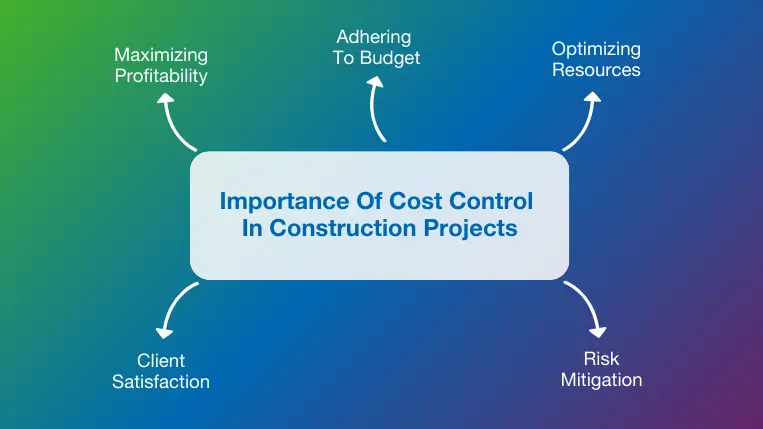
Keeping expenses under control is essential for projects to stay within budget, meet financial objectives, and generate a profit, whether it’s large-scale infrastructure investments or home renovations. Let’s examine the reasons why efficient cost control for construction projects is so crucial:
Maximizing Profitability
The aim of optimizing profitability is central to any building project. Construction companies can identify opportunities for cost savings, allocate resources efficiently, and minimize waste with the aid of effective project cost control, ultimately enhancing the project’s financial performance and increasing their profit margins.
Adhering to Budget
For any construction project to be successful, sticking to the budget is essential. Cost overruns may result in financial hardship, hold-ups, and possible disagreements with stakeholders or clients. Construction companies can identify early budget deviations and take remedial action to mitigate risks by implementing strict cost control procedures, including precise budget forecasting, meticulous spending tracking, and variance analysis. This guarantees that projects are completed within allocated budgets, building stakeholders’ and clients’ trust and confidence.
Optimizing Resources
In building projects, optimizing efficiency and reducing waste depend on resource optimization. Through cost control procedures, construction companies can identify opportunities for resource consolidation or substitution, allocate resources efficiently, and optimize the utilization of labor and materials. Construction companies can increase productivity and reduce operating costs by leveraging technology, adopting lean construction principles, and following best practices in resource management. These actions will ultimately improve project outcomes.
Risk Mitigation
Construction projects are naturally vulnerable to risks and uncertainties, which can significantly impact expenses. Risks can range from unexpected changes in scope to supply chain disruptions, and efficient construction cost control techniques help reduce and mitigate their financial impact. Through comprehensive risk assessments, the creation of backup plans, and the maintenance of strong communication lines, project managers can identify potential hazards and proactively address them to minimize their impact on project expenses, ensuring the continuity of the project.
Client Satisfaction
Maintaining client satisfaction and building lasting partnerships depend on completing projects on time and under budget. Cost control strategies give clients confidence and enhance their experience by demonstrating a commitment to transparency, accountability, and value for money. Construction companies can build customer trust, boost recurring business, and receive good referrals by providing realistic cost estimates, skillfully managing expectations, and completing projects on schedule and within budget.
It is worth noting that effective project scheduling not only helps in controlling the project timeline and resources but also supports overall project management by providing a structured approach to achieving project objectives on time and within budget.
What can Construction Cost Control Software do for You?

To help you understand exactly how you can improve project performance, here are some of the main ways that construction cost control software can improve cost control in construction management.
Cost Management Tools
One of the most obvious ways that construction software solutions improve cost control is through the range of tools available to manage construction finances. This includes tools for measuring drawings, budgeting, project estimating, project planning, procurement, capturing deliveries, invoicing, tracking expenses, and forecasting costs to completion.
When you use a comprehensive platform for project management in construction, all of these modules are fully integrated. This means project managers always work from the same source of truth. It also means that each stage of cost control, from the initial estimation to the final invoice, runs off the same numbers.
Starting with an accurate estimation is key to successful construction project cost management. Having powerful estimation tools and then following through with your estimate with budgeting and expense tracking tools is highly beneficial. It means construction costs are visible at all times, which makes cost control easier to manage.
Automated Processes
The right construction cost management software can automate manual processes, streamline workflows, and reduce costs. This reduces the risk of errors while improving efficiency. In terms of cost control in construction projects, this approach offers numerous benefits.
Most importantly, construction project managers can be assured that they’re always working off accurate financial data. Automation tools can reduce the costs associated with time-consuming administration and calculations, which adds more control to your project budget.
Financial data from each stage of the project integrates with the next stage. This results in greater accuracy throughout the project, as well as saving time in managing these costs.
Real-Time Insights
Construction software can provide real-time data on project expenses, enabling managers to pinpoint areas where costs exceed budgets and make necessary adjustments.
An end-to-end cost management software platform can monitor data across the entire project lifecycle. This information is readily available to construction managers. They can also create various construction reports at the click of a button.
Access to data-driven insights can help project managers make timely decisions associated with cost control. This helps to keep projects running on track and with minimal interruptions.
Improved Insights
Following on from the section above, construction software can also provide more detailed insights into projects. This helps managers and teams make more informed decisions around cost control.
It also provides more clarity on what kind of impact certain decisions will have during the project. It also provides greater accuracy for estimations, quantity takeoffs, budgeting, and overall cost control. By having access to these insights, keeping your project on track and within budget becomes a lot easier.
Enhanced Collaboration
By utilizing a cloud-based cost management software solution, all project stakeholders can access the necessary information at any time. This provides a single source of truth for the project, ensuring that everyone works from the same, up-to-date information.
Making the project information so easily accessible significantly improves construction collaboration. It reduces the need for constant meetings and updates. Additionally, remote teams can plan and manage their areas of the project more efficiently.
The results are a more efficient workflow and more informed decisions being made throughout the project life cycle and project teams. Seamless collaboration is one of the most essential elements for keeping your project on track. Thus, achieving this enhances the overall cost control of the project.
Subcontractor Management
Effectively managing subcontractors is a key aspect of effective construction cost management, and professional software can help ensure successful and profitable relationships across the entire project. Powerful features for subcontractor comparisons enable teams to gather and compare subcontractor quotes that best align with the project’s financial and quality goals.
Additional functionalities, such as automated invoicing, change order management, and real-time communication, reduce administrative overhead and minimize errors. They also help assess the cost implications of project modifications promptly, thereby avoiding delays and cost overruns.
This centralized approach to subcontractor management not only enhances financial security but also ensures strong and transparent relationships, which in turn leads to fewer errors and better cost control.
BIM Integration
BIM has become one of the most powerful technologies to manage construction projects, including cost control. A 3D model integrates time and money into a highly detailed digital representation of the building or structure, allowing for real-time decision-making that can significantly enhance a project’s success.
For example, RIB CostX offers a powerful BIM estimating software that automates the quantity takeoff and estimating processes by extracting information directly from the model. This provides an unmatched level of accuracy, supporting efficient budgeting, and cost control. Additionally, the model can identify conflicts or design issues early in the project, allowing for problems to be addressed before they can become costly errors.
BIM integration also fosters collaboration among all project disciplines, ensuring that everyone works with the latest available data and prevents errors due to misaligned strategies.
Top Cost Control Software in Construction
Staying ahead of the curve requires utilizing cutting-edge software solutions as projects become increasingly complex and budgets become tighter. Five stand out as industry leaders among the many options available: RIB Candy, RIB CostX, RIB BuildSmart, RIB 4.0, and RIB CX.
Let’s examine how this construction cost management software is transforming cost control in the building sector:
RIB BuildSmart

RIB BuildSmart is an effective construction cost control software solution that comes with an array of features that make tracking expenses, forecasting, and budgeting simple. BuildSmart addresses the entire construction project lifecycle, allowing you to generate group consolidation reports and access accounting information from any location at any time. Its real-time analytics, cost reporting, and dashboarding capabilities enable timely, efficient, and powerful decision-making with access to the most current and precise information at the click of a button.
RIB Candy
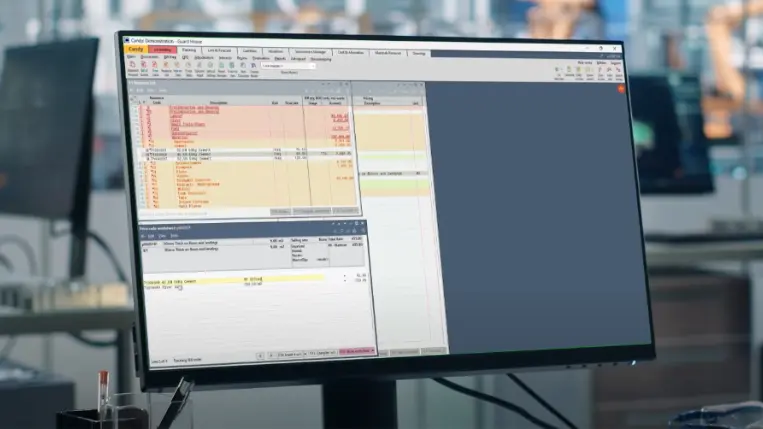
RIB Candy is a comprehensive construction estimating software solution designed to streamline project planning, estimation, and cost control. For construction companies of all sizes, the RIB Candy project cost management software offers unmatched flexibility and scalability due to its user-friendly interface and extensive feature set. With the help of RIB Candy, customers can effectively and precisely control costs by producing accurate reports, managing project expenses, and providing comprehensive cost estimations. For construction industry experts looking to streamline cost control procedures and boost project success, its user-friendly design and sophisticated analytical capabilities make it the preferred option.
RIB CostX
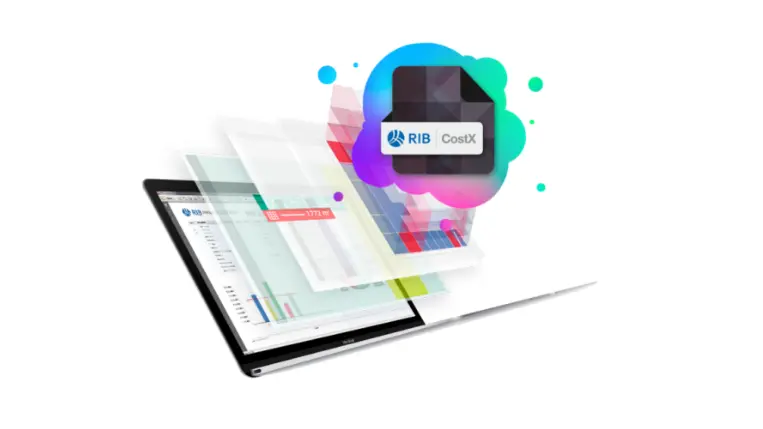
RIB CostX is a robust BIM takeoff software with outstanding estimating capabilities, making it simple and quick for construction companies to provide precise cost estimates. RIB CostX’s sophisticated measurement and construction takeoff capabilities simplify the estimation process, enabling customers to produce thorough cost breakdowns and quantity surveys with previously unheard-of speed and accuracy. The RIB CostX construction cost management software solution provides the features and resources necessary to generate accurate estimates and effectively manage project costs, regardless of whether materials, labor, or equipment costs are being estimated. Its value and versatility are further enhanced by its connection with CAD and 3D files, making it a top option for construction professionals worldwide.
RIB 4.0
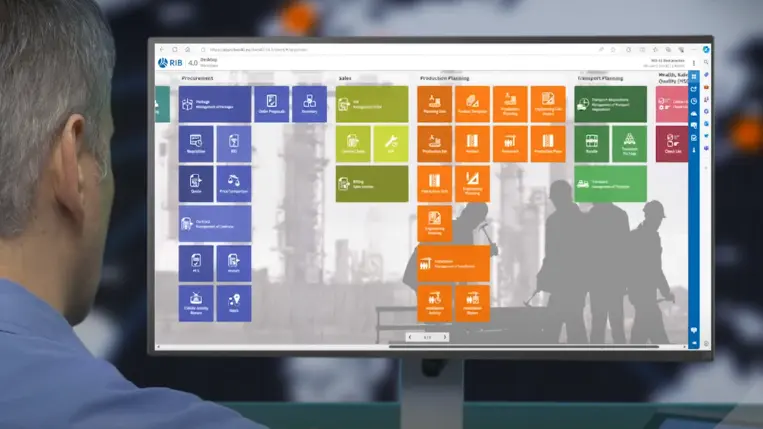
RIB 4.0 is a state-of-the-art enterprise construction management software that offers collaborative features, cost management, and sophisticated project controls all in one integrated solution. RIB 4.0, based on the latest cloud technology, provides instant access to project data, facilitating easy communication and collaboration between project stakeholders. Its extensive feature set addresses all facets of cost control, including construction change management, procurement, forecasting, and budgeting. RIB 4.0 enables construction companies to track expenses, mitigate risks, and optimize project outcomes from any location at any time, thanks to its user-friendly interface and mobile-friendly design.
RIB CX
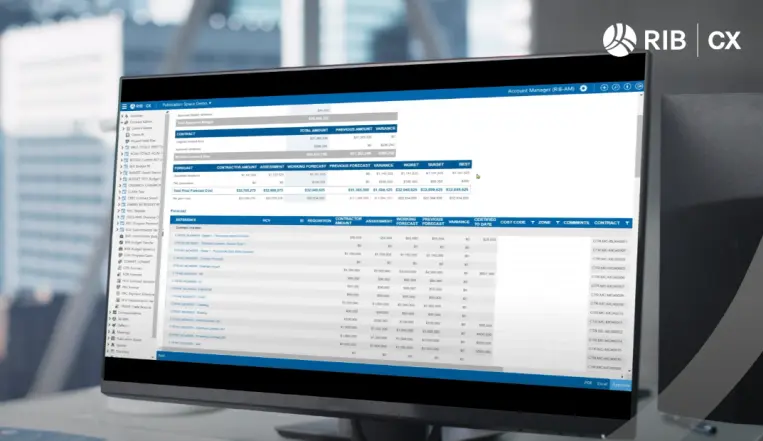
RIB CX is a powerful, web-based construction management software with advanced features for document management, contract administration, quality and defect management, reporting, and more. All these robust modules come together in a centralized platform that ensures all performance and financial aspects of a project are accounted for. Live reporting features ensure that any defects, changes, or risks are tracked in real-time, allowing them to be mitigated as soon as they occur and analyzed for their impact on the schedule and budget. Paired with this, the software can be fully customized to meet the specific needs of the company, ensuring all modules are tailored to their processes.
Challenges of Implementing Construction Cost Control Software
Successful software implementation in construction is not just about investing in a new tool; it is all about aligning people, processes, and technology to create a solid, unified foundation for success. However, while it all sounds nice on paper, in reality, the process can be challenging. Older workers may exhibit resistance to change, and the software learning curve can hinder implementation. Below, we discuss the most common challenges and how to address them.
Resistance to change
Latest numbers suggest that the construction industry has an aging workforce, with over 39% of respondents stating that the number of workers over 60 years old is increasing annually. This situation presents a challenge due to the lack of a younger workforce, as well as the older workforce being more reluctant to change and adopt new technologies. Older workers often have decades of experience and success, which can lead them to believe that implementing software for cost control is unnecessary.
To overcome this challenge, it is of the utmost importance to involve them in the process, clearly communicate the benefits of a new system, and offer comprehensive training to build confidence and skills. Once the most experienced professionals are onboard, the company can foster a culture of innovation and continuous improvement.
Initial investment costs
Another challenge that can prevent construction companies from investing in cost control software is the initial investment. Most of these tools are expensive, and their costs can increase depending on the company’s size. Paired with the costs of a subscription or license, they must consider the costs for training staff and transitioning from old systems to the new one. However, as costly as it sounds, organizations should look at it as an investment rather than a loss of money. In the long run, professional construction cost tracking software can lead to substantial savings by enhancing budget accuracy, minimizing errors and overruns, and facilitating data-driven decisions. It is all about having an efficient change management plan where the short and long-term returns are clearly outlined.
Integration with existing systems
This can be one of the biggest challenges faced when investing in these solutions. Companies work with a range of existing systems for accounting, estimating, and reporting. Integrating the data from all these systems into a new, centralized cost control software can be challenging and incredibly time-consuming. Common issues during integration include data compatibility, differing software architectures, and the need for custom interfaces, which can complicate the process.
To tackle this challenge in the most effective and agile way, it’s essential to conduct a thorough analysis of current systems, engage IT professionals early in the process, and choose cost control software that offers flexible integration options.
Top 10 Best Practices for Construction Cost Management
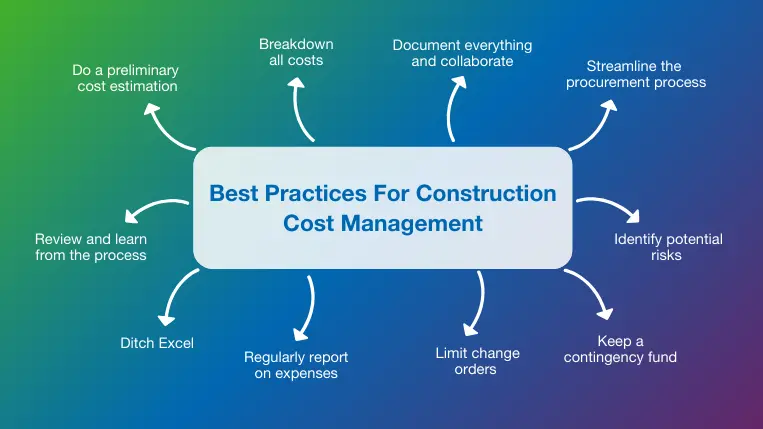
Any construction project must have effective construction cost management to ensure that risks are minimized, resources are utilized efficiently, and budgets are adhered to. The following list of the top 10 building cost management best practices includes everything from early cost estimation to using cloud technologies for real-time tracking:
Do a preliminary cost estimation
Before embarking on a construction project, conduct a thorough preliminary estimation to establish a baseline budget. To create a precise estimate of project costs, consider variables such as supplies, labor, machinery, permits, and overhead.
Selecting the proper construction cost estimation method that fits the project’s size, needs, and complexity is a best practice to kick things off on the right foot. Ditching tedious, error-prone manual calculations and utilizing professional estimating technology is another tip to consider for preventing common issues from compromising the accuracy of your estimates.
Break down all costs
Using a cost breakdown structure (CBS) enables methodical categorization and arrangement of project costs. This makes improved tracking, analysis, and management possible throughout a project. A well-structured CBS contains a breakdown of direct costs, such as labor, materials, and equipment, as well as indirect costs, including administrative expenses, permits, fees, and insurance. The benefits of having this categorized document are enhanced visibility into where funds are allocated, accurate financial planning, and effective cost monitoring for informed decision-making.
Document everything and collaborate
Maintain a detailed record of all project-related costs, agreements, change orders, and correspondence to ensure transparency and accountability. Encourage cooperation between suppliers, subcontractors, contractors, and other project stakeholders to ensure alignment and reduce misunderstandings.
Keeping a record of all financial aspects of a project can help prevent legal disputes with contractors and subcontractors, as well as support regulatory compliance. It can also help inform financial decisions for future similar projects, supporting accurate forecasts and estimates.
Streamline the procurement process
Streamline the construction procurement process to increase economy and efficiency. Standardize your procurement processes, negotiate favorable terms with suppliers, and leverage bulk purchases to reduce expenses and expedite the procurement process. Make estimate information available for procurement to prevent overspending at the quantity, rate, and total levels.
Adopting a strategic sourcing strategy involves analyzing spending patterns, consolidating purchases, and promoting competitive bidding, which can lead to significant cost savings and improved supplier performance. By focusing on building strong supplier relationships and continuously assessing market conditions, companies can mitigate risks associated with price volatility and supply chain disruptions.
Identify potential risks
Unexpected risks can lead to budget overruns that can derail all cost control efforts. Implementing an effective construction risk management plan, where risks are identified early and mitigation strategies are implemented to prevent them, is of the utmost importance. Anyone with experience in construction knows that some risks are unavoidable. Therefore, it is advisable to conduct a thorough risk assessment and plan for contingencies to mitigate the impact of risks on project costs, such as supply chain interruptions, labor shortages, weather delays, and scope changes.
Keep a contingency fund.
As mentioned in previous points, establishing a contingency fund is crucial for covering unanticipated costs and mitigating risks. Maintain a buffer of funds to handle unforeseen scope modifications, cost overruns, or emergencies without compromising the project’s financial stability. Our comprehensive guide on construction contingencies offers valuable insights and best practices for successfully managing project contingencies.
Limit change orders
Reduce the number of change orders to avoid budget overruns and scheduling conflicts. Change orders can consume a significant portion of the budget if not managed effectively. Some change orders, such as owner-driven changes or unforeseen site conditions, are unavoidable and are usually accounted for in the contingency budget. However, change orders for errors and omissions are highly avoidable with a proactive approach. Establish project requirements upfront, communicate with stakeholders efficiently, and carefully consider any suggested adjustments to determine their impact on the budget and timeline.
The powerful collaboration and document management features included in cost control software enable transparency for all parties, ensuring smooth approval processes and effective auditing. Forecasting features ensure risks can be anticipated and managed before they become costly change orders in the future.
Regularly report on expenses
Establish a reliable system for tracking project expenses to ensure they are accurately and clearly visible. Provide regular updates to stakeholders regarding budget status, deviations, and anticipated expenses to be accountable and facilitate informed decision-making.
Ensure the reporting system you implement is tailored to all audiences. On more than one occasion, you may need to present data to individuals who are unfamiliar with financial terms, which can lead to divisions or misunderstandings that may also result in increased costs. Professional construction cost control software, such as the ones mentioned earlier in the post, offers intuitive reporting features with interactive graphs and charts that make data more accessible to anyone, regardless of their technical knowledge, ensuring that strategic decision-making is supported across all teams and departments.
Ditch Excel
For cooperation and real-time tracking, switch from conventional spreadsheet-based techniques to cloud-based construction management software. Cloud software facilitates construction communication and improves insight into project expenses by providing centralized data storage, real-time updates, enhanced visibility and eliminating data silos.
Additionally, professional software eliminates the need for manual calculations that are required when working with traditional tools like Excel, which can lead to human error. With a centralized, digital location to manage all data in a practical and automated way, companies can benefit from accurate cost control with collaboration at the forefront.
Review and learn from the process
Conduct post-project reviews to assess the effectiveness of cost management and pinpoint areas for development. Analyze cost variances, project results, and lessons learned to improve cost management procedures and project performance in the future.
During this review process, it is of the utmost importance to involve all disciplines and project stakeholders to ensure all perspectives and experiences are taken into account as learning opportunities.
Conclusion
Construction companies can efficiently optimize project budgets, reduce risks, and expedite their cost control procedures by utilizing cutting-edge technologies and novel features, including collaboration platforms, real-time tracking capabilities, and accurate cost estimation tools. These software programs help users create precise cost estimates, keep careful tabs on spending, and spot possible areas for cost savings, all of which can improve project outcomes and increase profitability.
Investing in modern construction cost management software is not only a choice but a necessity for staying ahead of the curve and achieving sustainable growth in today’s dynamic construction market. As projects become more complicated and competitive, the importance of cost control cannot be overstated. If you are ready to benefit from a state-of-the-art construction toolkit to boost your efficiency and profitability, get a demo for RIB Software today!
Most Recent
11 mins read
10 mins read
10 mins read
29 mins read
Blog Categories
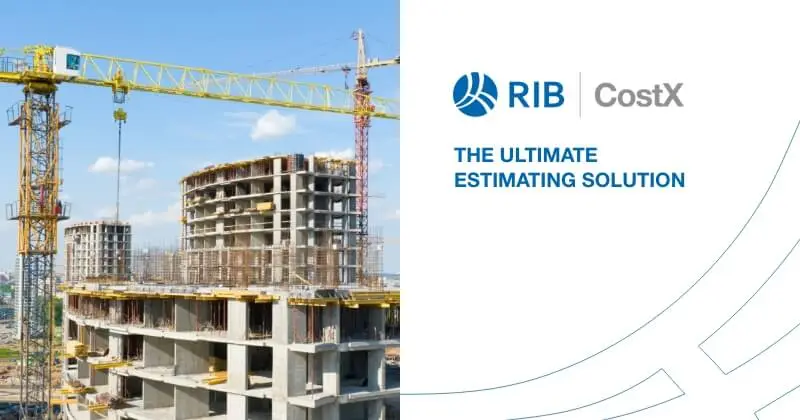
Ebook





